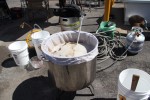There has been a substantial spike of late in the number of brewers in planning calling me with a variety of questions about how this weird world works. As an advocate for the growth of Kentucky beer, I am always happy to lend whatever knowledge I have gained in this industry to anyone seeking to make their own mark. I’m excited to see all the quality folks entering the game these days, and I’m even more excited to try their product when they open. They always have some interesting questions, but there are a few that seem to pop up in nearly every conversation. I put answers here not to deter people from asking me themselves but simply to edify about some of the common issues facing new breweries these days. Keep in mind these are not absolute truths, just my opinions. Enjoy the flavors.
How much money will this cost?
A lot. No matter whether you open a production brewery or a brewpub, a big brewery or a small one, a startup or an expansion, breweries are capital intensive propositions. You will tie up lots of money in steel, copper, malt, hops, and yeast that you will see no return on for a lot longer than you want. Add up all the equipment you need. Add all the ingredient costs to fill your tanks twice. Add all the labor, rent, utilities, insurance, fees, etc. you expect to have from the day you start spending money to 6 months after you plan to open. You will spend two to four times that total before you see money come in. My goal is not to be a prophet of doom but to be realistic about the extraordinary level of unexpected expense and delay in starting a brewery. I have never seen a brewery open on time. Permits lag, construction takes too long, equipment fails, packaging gets lost in transit, and all manner of other unpleasantry occurs. You need to have access to sufficient cash to weather these storms. Few things will kill a startup brewery like being undercapitalized. Don’t let it happen to you.
What numbers do I need to keep track of?
In short, all of them. There are, at bare minimum, three main categories of numbers that need to be tracked in a successful brewery: brewing, tax, and accounts.
If you are starting a brewery, you have probably brewed before either at home or commercially, so you know what numbers we are talking about. Quality product is necessary for success, and accurate process tracking is necessary for quality. Pay attention to and record all important brew numbers. This includes but is not limited to recipe amounts, temperatures, gravity measurements, times, volumes, pH measurements, and cell counts. Anything you want to do well and do well again must be recorded. Don’t just assume you will remember. You have never been as busy as you will be during this startup. Write that shit down!
Taxation is also an uncommonly onerous part of the brewing business. Some states are more friendly than others in their amounts and forms, but no one is free from beer tax entirely. At the bare minimum you will have federal excise taxation unless you export 100% of your product. No one in the world can tell you how to fill these forms out correctly, but if you do it wrong there are legions of people who can yell at you and imperil your financial success. Before you start brewing, print off copies of blank sheets, make up fictional (but reasonable) numbers, and try to fill out the forms. Think of it like homework worksheets. Make them make sense. Doing so will maximize your chance of getting them right when you really have to pay your taxes (and taxes and taxes and taxes…). As a public service announcement, overpayment is almost as problematic as underpayment. Don’t do either.
Third, you have to remember that operating a brewery isn’t just about brewing. When you stepped out of homebrew and into commercial brewing you also stepped into the world of business. Track all your expenses and sales. Keep accounts payable and accounts receivable. Understand your cash flow. Understand labor costs and ingredient costs as a percentage of business. Know the important difference between making money and making profit. It is far better to have data you do not need than to need data you do not have, so record everything and do so accurately. If you can’t do this, learn. If you can’t learn, hire someone who can.
What model should I use/ What kind of beers should I brew?
“This above all, to thine own self be true.” Polonius was right. Be honest with yourself about the beers you want to make. Whether or not you enjoy what you are doing will shine through to your final product. Make the beers that excite you. That isn’t to say you shouldn’t do your market research and find ways to maximize profitability in your situation. Certainly do that as well, but never forget that you are a craftsman. You probably didn’t get into this to brew for the lowest common denominator. If you have a passion for what you do, the beer will be better than if you do not. If you got into this business to brew the best damn amber anyone has ever tried, then make that amber. If your heart lies in recreating colonial spruce beer, do that. If you need to make a bourbon and wine barrel aged coffee and cacao brett white porter (what idiot would make that?) then make it so. I can’t tell you what beers your brewery should make. I can just tell you to tell yourself. And be honest.
Are there already too many breweries?
Oh, man. I love this one. Let’s save it for next time, shall we?
Until then, faithful readers, thanks for reading, and happy drinks!
P.S. Remember to let me know if you have some specific topic you would like me to babble about next time. You can tell me in person, by e-mail, or in the comments right down below.






